| Srl | Item |
| 1 |
ID:
113200
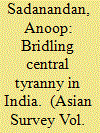

|
|
|
|
|
| Publication |
2012.
|
| Summary/Abstract |
Successive national governments in India have invoked an emergency constitutional provision to impose direct central rule in states over 100 times since 1950. However, such central government usurpation of state governance has declined since the mid- 1990s. This essay demonstrates how India's regional parties, by entering into opportunistic alliances with national parties and joining coalition central governments, have become effective barriers against central dominance. It also identifies the specific dynamics through which this effective veto power is exercised.
|
|
|
|
|
|
|
|
|
|
|
|
|
|
|
|
| 2 |
ID:
170901
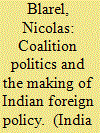

|
|
|
|
|
| Summary/Abstract |
Do Indian regional parties influence foreign policy and under which conditions? Some foreign policy studies have shown that certain coalition-building configurations have facilitated the inclusion of the concerns of small parties in the foreign policy debate. Other works have looked at the role of decentralization and federal power-arrangement in providing more control to political sub-units over the external affairs of a state. Those separate scholarships provide interesting insights to account for the multi-level nature of coalition-building in a federal and pluralistic polity like India. Bridging these two literatures, I argue that the interdependence of regional and national coalition building processes (visible in federal settings) create locked-in alliances between national parties and regional parties which affect foreign policymaking. In these contexts, India’s national parties have to, under certain conditions, take into account the preferences of regional parties when designing foreign policies. This article looks at the hypothesized causal mechanisms and expectations through two illustrative case studies of India’s foreign policy.
|
|
|
|
|
|
|
|
|
|
|
|
|
|
|
|
| 3 |
ID:
151139
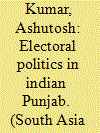

|
|
|
|
|
| Summary/Abstract |
The forthcoming Assembly elections in Punjab in early
2017 indicate signs of a new phase in the electoral history of this
state, largely dominated earlier by various political alliances headed
by the Shiromani Akali Dal (SAD) under Jat Sikh leadership.
Presented within the wider Indian electoral landscape, this article
offers an analytical overview of Punjab’s electoral politics as it has
evolved since partition from the vantage point of SAD. It is argued
that there are several good reasons why traditional SAD domination
and style of leadership are presently being challenged through a
combination of new political actors and, significantly, changing
awareness among a very diverse electorate about what to expect
from any government one elects.
|
|
|
|
|
|
|
|
|
|
|
|
|
|
|
|
| 4 |
ID:
110822
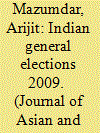

|
|
|
|
|
| Publication |
2012.
|
| Summary/Abstract |
This article argues that the results of the Indian General Elections, 2009, emphasize continuity more than change. Regional political parties, local-level issues and identity-based politics remain significant. The verdict represents a confirmation of established patterns of electoral politics in India and not a break with the recent past.
|
|
|
|
|
|
|
|
|
|
|
|
|
|
|
|
| 5 |
ID:
123216
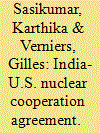

|
|
|
|
|
| Publication |
2013.
|
| Summary/Abstract |
The U.S.-India civil nuclear energy agreement triggered a contentious debate in India from 2005 to 2008. Regional political actors played crucial and unanticipated roles in the debate. We present explanations for the positions adopted by the main actors and the level of contention. We find that parties' positions were driven not by ideology but by the compulsions of coalition politics.
|
|
|
|
|
|
|
|
|
|
|
|
|
|
|
|
| 6 |
ID:
157480
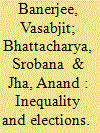

|
|
|
|
|
| Summary/Abstract |
This article investigates the causes of India's Maoist insurgency and its changing dynamics. To explain its origins, we empirically test three hypotheses using cross-state-level data: inequality of wealth in states; inefficient state government; and, disgruntled provocateurs. Our analysis reveals that insurgency is caused by inequality of wealth in states, not inefficient state governments and disgruntled provocateurs. Subsequently, we study variations in the number of Maoist attacks and the selected targets in the eastern Indian state of West Bengal using newspaper reports of events. Our analysis demonstrates that the numbers of incidents and the type of targets selected depend on electoral competition between regional political parties and their interactions with Maoists. The findings, therefore, indicate that whereas inequality of wealth can explain the insurgency's presence in states, political competition within states could explain its dynamics.
|
|
|
|
|
|
|
|
|
|
|
|
|
|
|
|
| 7 |
ID:
119549
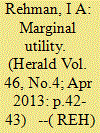

|
|
|
| 8 |
ID:
178566
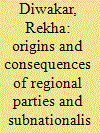

|
|
|
|
|
| Summary/Abstract |
This article explores the origins and consequences of India’s regional parties and subnationalism, focusing and expanding on the key arguments made by Prerna Singh and Adam Ziegfeld in their books. According to Singh, when political leaders promote an inclusive form of subnationalism, it creates a feeling of cohesive solidarity across the region, which helps to achieve superior social welfare outcomes in the Indian states. Ziegfeld provides an elite-centered explanation for the emergence and success of India’s regional parties, and considers Indian politics to be dominated by clientelistic relationships between parties and voters, which leads to delivery of particularistic rather than public goods. The article also discusses two key themes emerging from the books relating to the importance of subnational versus national identity, and the significance of interests versus ideas in shaping Indian politics and public policy. Finally, it identifies future areas for research on regional parties and subnationalism in India.
|
|
|
|
|
|
|
|
|
|
|
|
|
|
|
|
| 9 |
ID:
139629
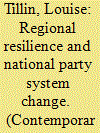

|
|
|
|
|
| Summary/Abstract |
For the first time in 30 years, a single national party has won a majority on its own in the Indian parliament, and does not depend on the support of regional party allies for a parliamentary majority. Yet it is too soon to pronounce the decline or marginalisation of regional parties in India's national political life. The aggregate performance of regional parties remained resilient in the 2014 elections, even marginally improving over 2009. This article considers whether the 2014 elections mark a critical break in the position of regional parties at the national level. The principal argument is that the 2014 elections do not reflect a fundamental alteration in the dynamics of political regionalisation. Rather they suggest a new phase in the impact of regionalisation on the party system at the national level. In a landscape of continually increasing voter choice, electoral outcomes at the national level have begun to narrow to favour a smaller range of parties since 2004. The number of parties able to achieve influence via participation in cabinet governance or coalition has begun to decline. Political fragmentation has not gone away, but its consequences for election outcomes have changed.
|
|
|
|
|
|
|
|
|
|
|
|
|
|
|
|
| 10 |
ID:
173329
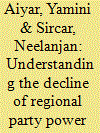

|
|
|
|
|
| Summary/Abstract |
In this piece, we argue that the electoral performance of the BJP, and the popularity of Narendra Modi, has significantly altered the dynamic of regional party politics in India. The BJP’s undiluted power at the Centre has created the political context for greater centralization of power. This in turn has generated greater distinctions between regional and national politics. The popularity of Prime Minister Modi combined with his party’s ideological project generates a deeply centralized national politics that can be easily distinguished from regional politics for the voter. This increasingly distinct form of national politics weakens the role of regional parties in national politics, both in electoral terms and in bargaining power, as regional parties rarely have well-defined, credible national policy platforms in India. However, it does, for the moment, appear to strengthen the electoral position of regional parties at the state level.
|
|
|
|
|
|
|
|
|
|
|
|
|
|
|
|